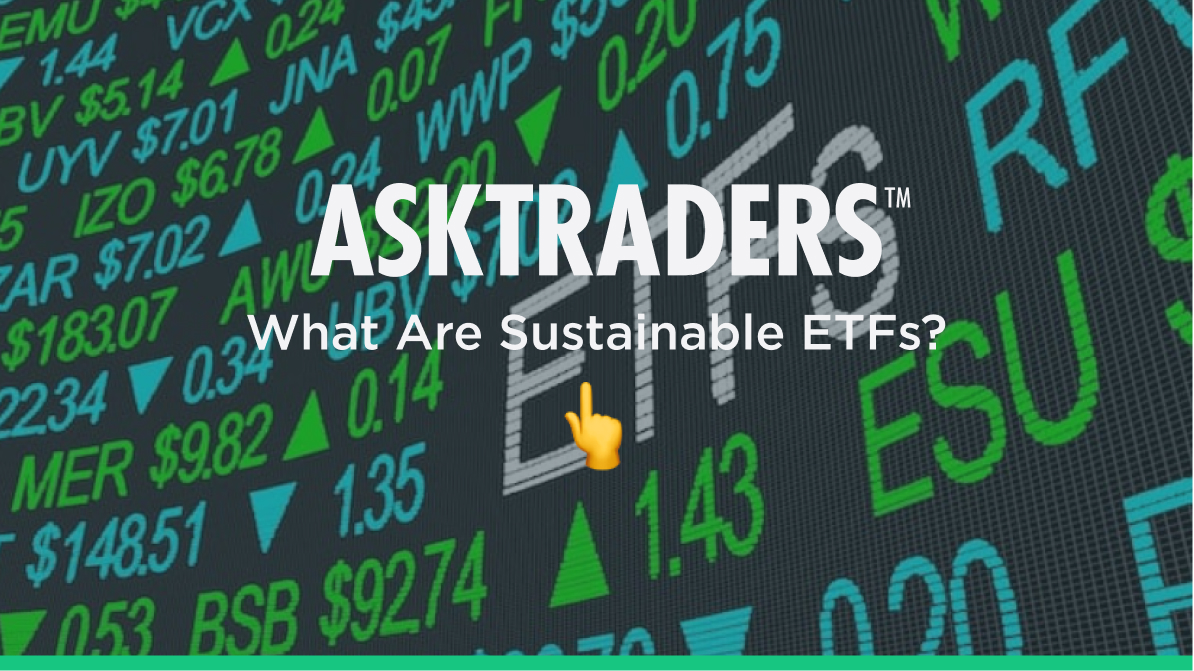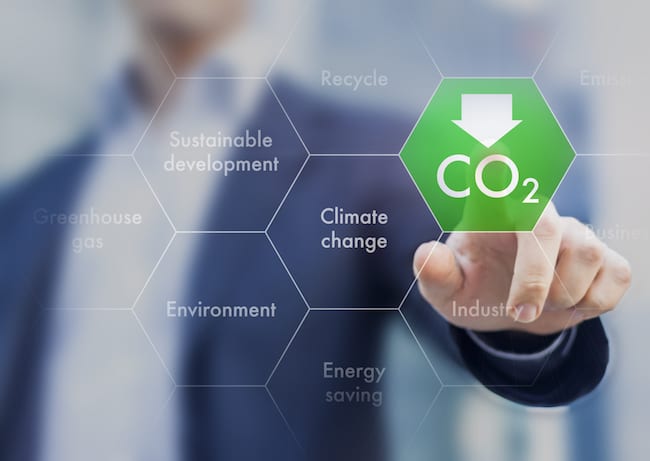With more and more investors keen to invest in socially responsible businesses, it is hardly surprising that companies within the financial services industry is responding to demand. Many brokers are now offering sustainable ETFs, also commonly referred to as ESG ETFs.
YOUR CAPITAL IS AT RISK

These funds allow investors to trade in ETFs that have been pre-screened to ensure the assets included in them are from the types of companies that ethical traders are happy to invest in.
Table of contents
What is an ETF?
An Exchange Traded Fund (ETF) is a fund that holds a variety of assets such as stocks, bonds or commodities, or sometimes a mixture of different types of assets. An ETF often tracks an underlying index, but the fund itself is a marketable security with an associated price, allowing it to be easily traded on exchanges (thus the name). ETFs have similarities with mutual funds, but whereas mutual funds trade once a day after the market closes, ETFs are frequently traded throughout the course of the trading day, just like any other stock. ETFs are popular due to the fact that they offer lower expense ratios and far fewer broker commissions than when trading individual stocks. They also allow for the bundling together of many assets, often with a common theme, which is where sustainable ETFs come in.
What is ESG screening? What are the criteria?
Unsurprisingly, given that ethical trading is becoming a popular trend in asset management, many brokers are now offering sustainable ETFs aimed specifically at attracting the money of ethical traders. Sustainable ETFs are also sometimes referred to as ESG ETFs, with the ESG referring to entities that adhere to environmental, social and governance principles. These ESG criteria are becoming a popular way for ethical traders to assess an organisation and see if they want to invest in it or not. According to the US SIF Foundation, investors held over $11.6tn in assets, chosen according to ESG criteria in 2018 — around $3.5tn more than they did just two years earlier.
ESG ETFs effectively screen companies based on environmental, social and governance criteria, so that ethical investors can go ahead and trade these ETFs secure in the knowledge that they are investing their money in socially responsible companies. This obviously saves a lot of time and effort, compared to traders having to carry out their own assessment of every organisation they invest in. But what exactly are the criteria used is ESG screening? As discussed in previous articles, social responsibility is very hard to measure with any accuracy, so sustainable ETFs are judged according to broad criteria, looking at the actions and activities of the companies involved.
Environmental criteria generally include things like energy use, waste, carbon emissions and carbon footprint, natural resource conservation, treatment of animals, the use of green energy, recycling targets and recycled materials used. Assessing a company’s environmental record might also involve evaluating the environmental risks a company faces and what level of risk management is in place. This could include an examination of whether the company owns any contaminated land, how it disposes of toxic waste, and how it has responded to any environmental issues it has been involved in. To meet environmental criteria, a company will generally have to have a strong record in this area, good preventative measures in place to avoid environmental harm and a record of responding promptly and appropriately to any accidental damage caused by their actions in the past. Obviously, they will also have to be compliant with all government environmental regulations.

Social criteria relates primarily to the organisation’s business relationships, as well as its links within the communities in which it operates. This may include how a company treats its employees and customers, how much it contributes to its local communities and wider society, and which causes and charities it supports and donates to. Social criteria can also include looking at a company’s supply chain and business partners to ensure it also demonstrates a commitment to social responsibility, as well as assessing how well the company treats its shareholders, customers, and other stakeholders.
Governance issues can include aspects such as transparency regarding business activities, accounting procedures, how senior leadership and board members are chosen, the level of executive pay, fee structures, shareholder rights and audit results. Many investors feel it is vital that companies and leaders within those companies are seen to operate with full transparency and integrity, avoid conflicts of interest and steer clear of any kind of corruption or questionable activities. For example, it is vital to many investors that companies do not use political contributions to manipulate political decisions and further their own interests.
While ESG criteria form a useful framework, it should always be remembered that no company is going to meet every standard. Investment firms must, like individual investors, make their own decisions about what constitutes an ethical investment. There will always be compromises to make, and some level of subjectivity when assessing which stocks to include in a sustainable ETF.
Pros and cons of ESG screened ETFs
ESG screened ETFs are a convenient option for ethical traders. They can save investors the time and effort of researching the ethics of the company behind every asset they trade, while still enabling investors to trade in stocks that are generally from socially responsible companies. However, there are some drawbacks.
As already mentioned, the issues we care about are personal and varied, so it’s hard to narrow your trading activities down to not only sustainable ETFs, but also ETFs including only companies that share your values and support the causes you believe in.
It’s also important to remember that ultimately you are looking to make a profit from your trading. For many years, ethical trading was considered as a trade-off for the investor. He or she got to feel good about the investments being made, but by limiting the number and range of companies they were willing to invest in, they also limited the potential for profit. After all, unethical companies sometimes perform extremely well, financially.
However, this is considered less of a restriction than it used to be. There are increasing numbers of ethical companies available to invest in. Many investors have come to believe that ESG criteria have a further advantage, in practice, in that they eliminate some companies whose unethical practices actually pose a very real risk to stock values. An environmental disaster or major scandal over the bad governance of a particular company will invariably be followed by a drop in stock prices, sometimes with billions of dollars’ worth of associated losses. Conversely, many companies that put social responsibility at the heart of their business practices tend to increase in value over time, as their ethical practices create positive growth, good PR and a happy, productive workforce.

Another potential disadvantage of ESG ETFs is that fees can be higher due to the research involved in compiling them. However, this is often not a significant difference, and expenses and fees for ETFs are already reasonable, generally working out as a fairly cheap way to trade. Brokers that offer a range of ESG ETFs include Interactive Brokers, Fidelity, and eToro.
Still interested in build a socially responsible investment portfolio based on sustainable ETFs? Take a look at our article on the best sustainable ETFs on the market.










